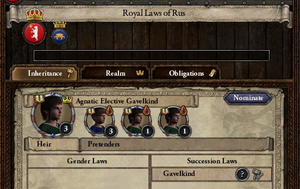选举均分继承法(英文:Elective gavelkind)结合了均分继承法和继承投票的特点。主头衔由统治者家族内选定的一员继承,但其他头衔可能被分配给统治者的儿子们。
选举均分继承法主要由未改革原始宗教部落统治者在没有其他继承法可选时使用。
特点
类似于均分继承法,此继承法+30%直辖领上限,不会因无地的成年儿子而受威望惩罚,不能销毁头衔。主头衔将会给主要继承人,而多于的头衔将被平等地分给低级的候选继承人。
类似于凯尔特选任法,领地内所有重要的头衔持有者会投票给统治家族的候选人。如果被选择的继承人不是统治者的儿子,统治者所有的儿子将被视作低级的候选继承人。
In addition, Elective Gavelkind has several unique features for junior heirs:
- Upon succession in kingdoms and empires, new kingdoms might be created for junior heirs. The outgoing ruler must control 51% of the de jure kingdom and meet any other specific requirements for creating that kingdom. Since many kingdoms have additional AI requirements, mostly related to culture, this means player realms are more vulnerable to splits than AI realms!
- Junior heirs always get the choice to become independent peacefully. While this does not cause a war, the primary heir receives claims on their primary titles. These claims are not inheritable, but they are strong, allowing them to be pressed simultaneously or, if tribal, pressed in a duel. Junior heirs controlled by AI choose whether to become independent based on whether they are
 /
/  and based on their opinion of their new liege.
and based on their opinion of their new liege.
If used by a player-controlled realm, the player will play as their elected successor in the primary title.
投票
投票者是低一至二级的直属(?)封臣。对于伯爵头衔,除了统治者没有其他投票者。
投票者对候选人的评价详见继承投票条目。选举均分继承法有两个特殊偏好:
- 投票者更喜欢青壮年(“他正处于全盛期”)
- Voters prefer candidates with high martial skill and personal combat skill (assuming warrior values)
好感
位于选举均分继承法下的统治者面临以下好感修正:
| 角色 | 好感修正 | 原因 |
|---|---|---|
| 子女 | +15 | 将会从继承中得利 |
| 非家族成员的封臣 | +5 | 主要继承人可以在家族分支中流动 |
策略
- 另见:均分继承法#策略
在帝国内,考虑授予王国给旁系亲属。这通常好于允许王国被分给低级的候选继承人,他们将有机会选择独立,如果他们仍然是封臣,就会倾向于索取派系宣称。
家庭生活重心可以提高和你孩子的关系,使低级的候选继承人选择独立的可能性降低。
